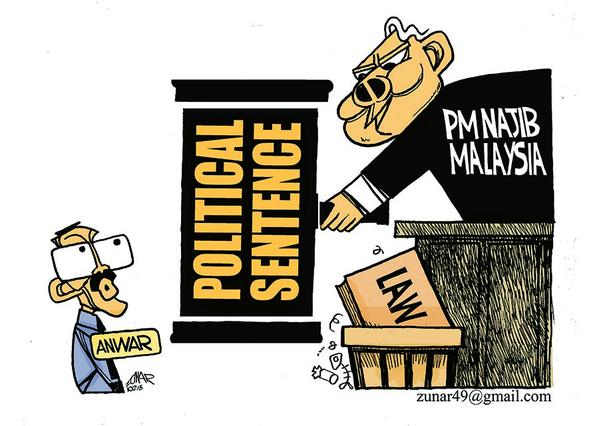Nearly two years ago, the ruling Barisan Nasional (BN, National Front) narrowly won reelection under prime minister Najib Razak.![]()
At the time, there was a strong argument that, notwithstanding several problems with Malaysia’s legal and electoral system, Najib probably did command something close to a mandate over the opposition, Pakatan Rakyat (PR, People’s Alliance) coalition.
Despite a strong fight by Pakatan Rakyat and its leader, Anwar Ibrahim, there was a clear case that Najib, just as his predecessors Abdullah Ahmad Badawi and Mahathir Mohamad, could count on just enough ethnic Malay votes to secure victory, even while ethnic Chinese, ethnic Indians and a growing number of young, urban voters of all ethnicities backed an increasingly competitive People’s Alliance. Though there was always more than a shadow of a doubt about the legitimacy of the Barisan Nasional‘s victory, it was credible enough to believe that Pakatan Rakyat simply fell short.
But since that election, Anwar’s persecution, prosecution and, now, conviction on sodomy charges throws much of that in doubt, alongside any notion that Malaysia operates under any recognizable rule of law. An appeals court affirmed Anwar’s sodomy conviction and five-year prison sentence earlier this week.
Rather unimaginatively, it’s not the first time that the ruling party has imprisoned Anwar on a trumped-up sodomy conviction. The first time came way back in 1998, when Anwar, deputy prime minister at the time and winning international plaudits for his handling of the Asian currency crisis, began to diverge from Mahathir. He was ultimately convicted of sodomy and corruption as well, for good measure. Anwar emerged from that encounter even stronger, giving the opposition a dynamic leader.
Anytime that a government with a skittish record of free and fair elections subsequently imprisons a political opposition leader, it should raise concerns. That’s as true in Malaysia as it is in Ukraine or Egypt. So the ham-fisted approach to Anwar’s political persecution shows us that Malaysia has not yet reached a point where it is truly serious about building truly robust democratic institutions or even committed to the rule of law. That was obvious enough in the country’s horrific response to the disappearance of Malaysia Airlines flight 370. Though there’s widespread disparity between wealthy Kuala Lumpur and the more rural parts of Malaysia, it’s clearly a country with rising standards of living that is struggling to make the transition from middle to high development.
Malaysian authorities are so skittish over Anwar that they’ve also started imprisoning journalists who speak out against his conviction as politically motivated, including political cartoonist Zulkiflee Anwar Alhaque, known as Zunar, for publishing this cartoon:
That Anwar’s conviction is for ‘sodomy’ casts even more doubt on Malaysia’s rule of law. Anwar has been married for decades and has six children (his eldest daughter Nurul Izzah binti Anwar is likely to assume the mantle of opposition leader now that Ibrahim himself faces five years in prison). But it’s telling that the Malaysian government is smearing him with the homosexuality label — and indicates just how troubling life in Malaysia must be for the LGBT community. Even if Anwar were an openly gay man, the fact that Malaysian authorities have criminalized homosexuality shows that the country is already out of step with international norms. Though few Asian countries recognize same-sex marriage, very few countries continue to maintain laws criminalizing homosexuality.

